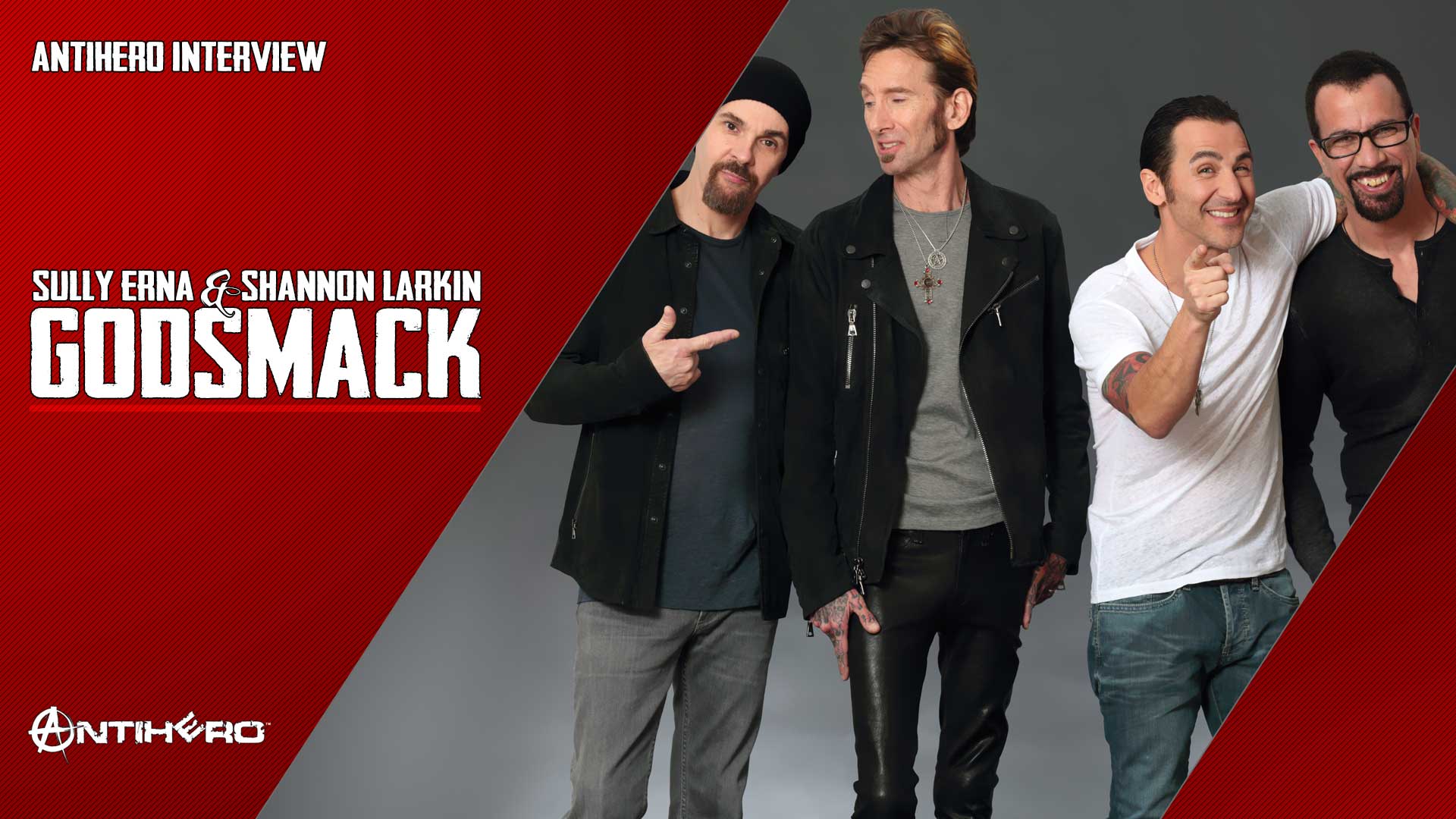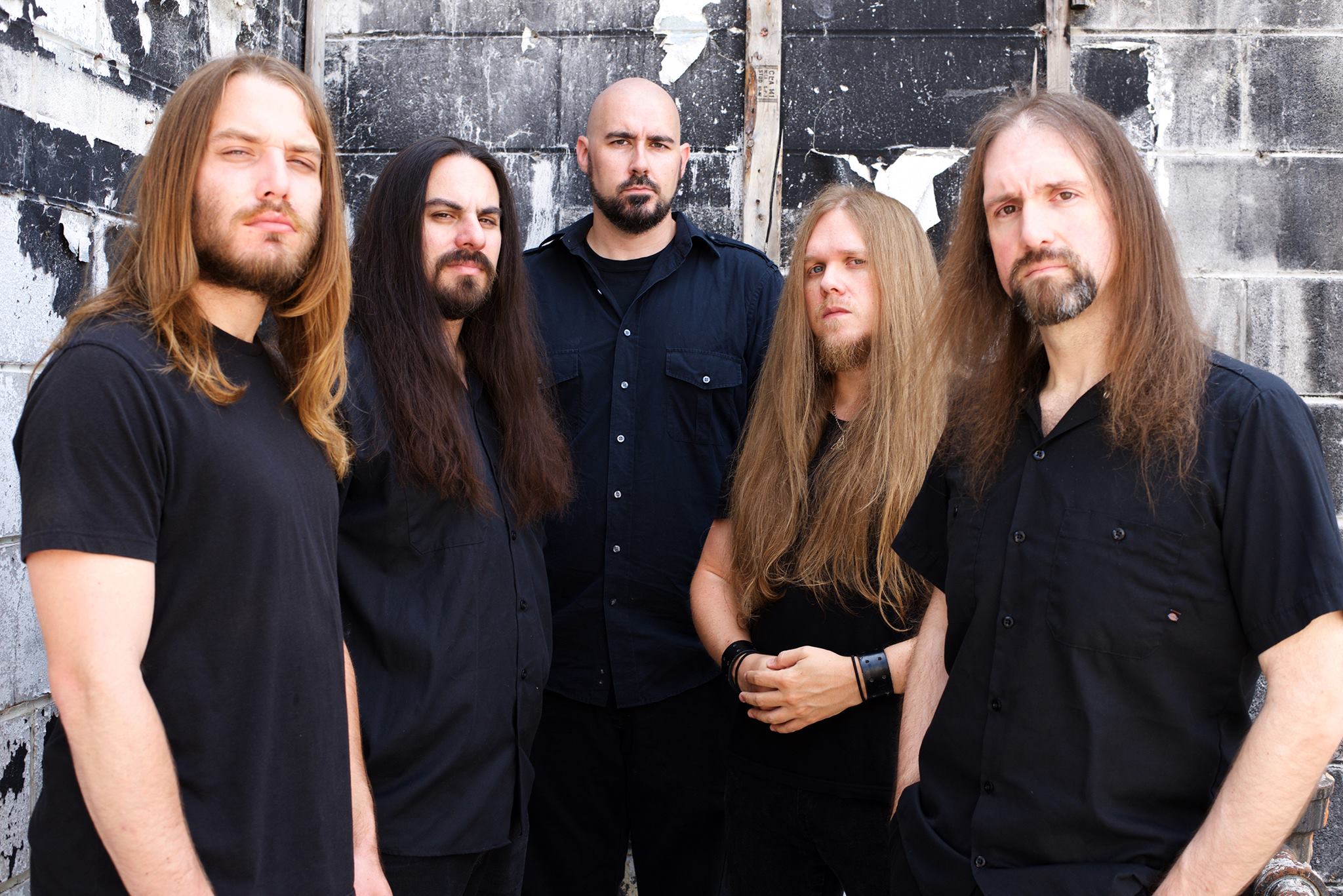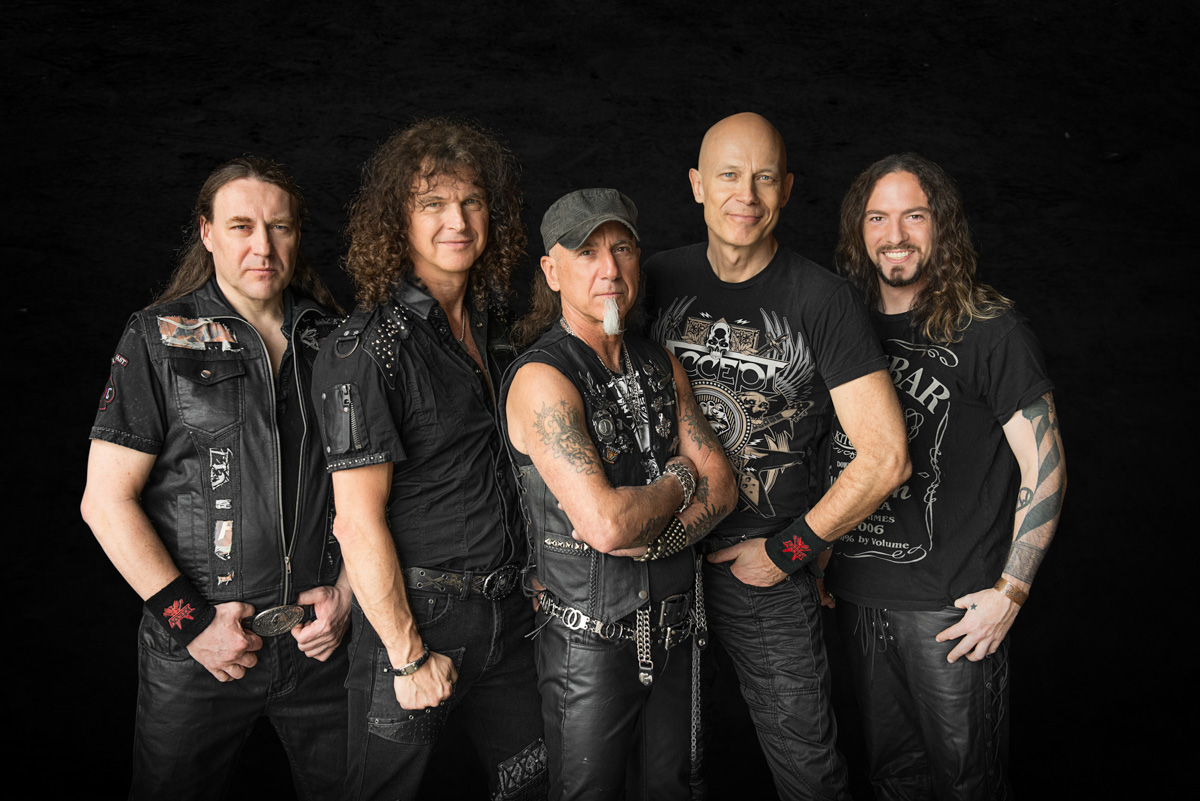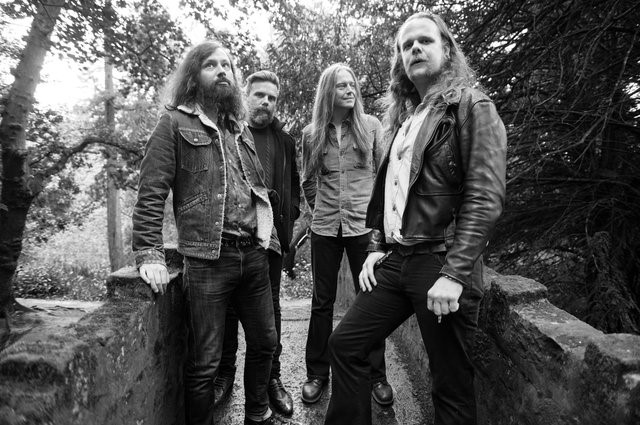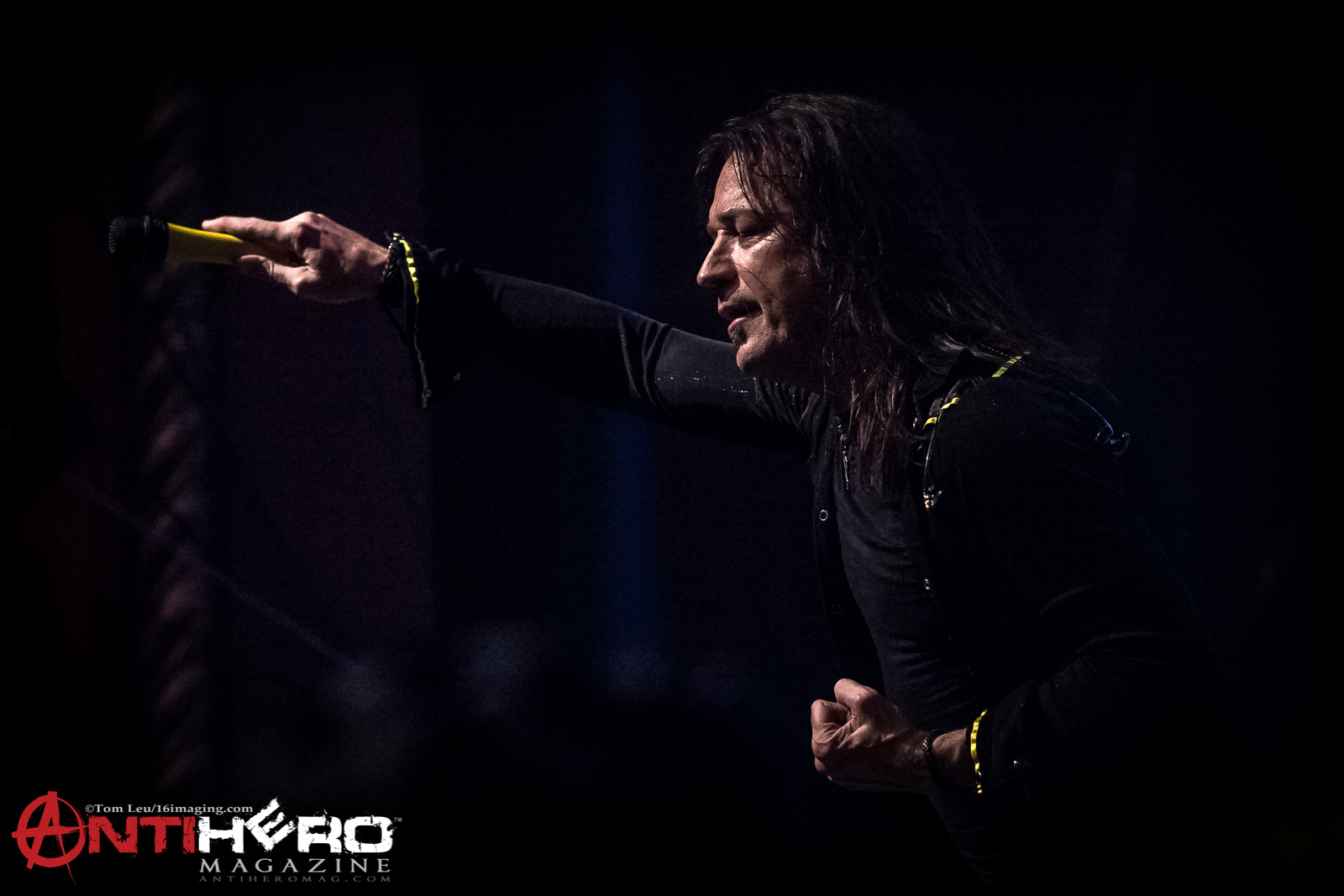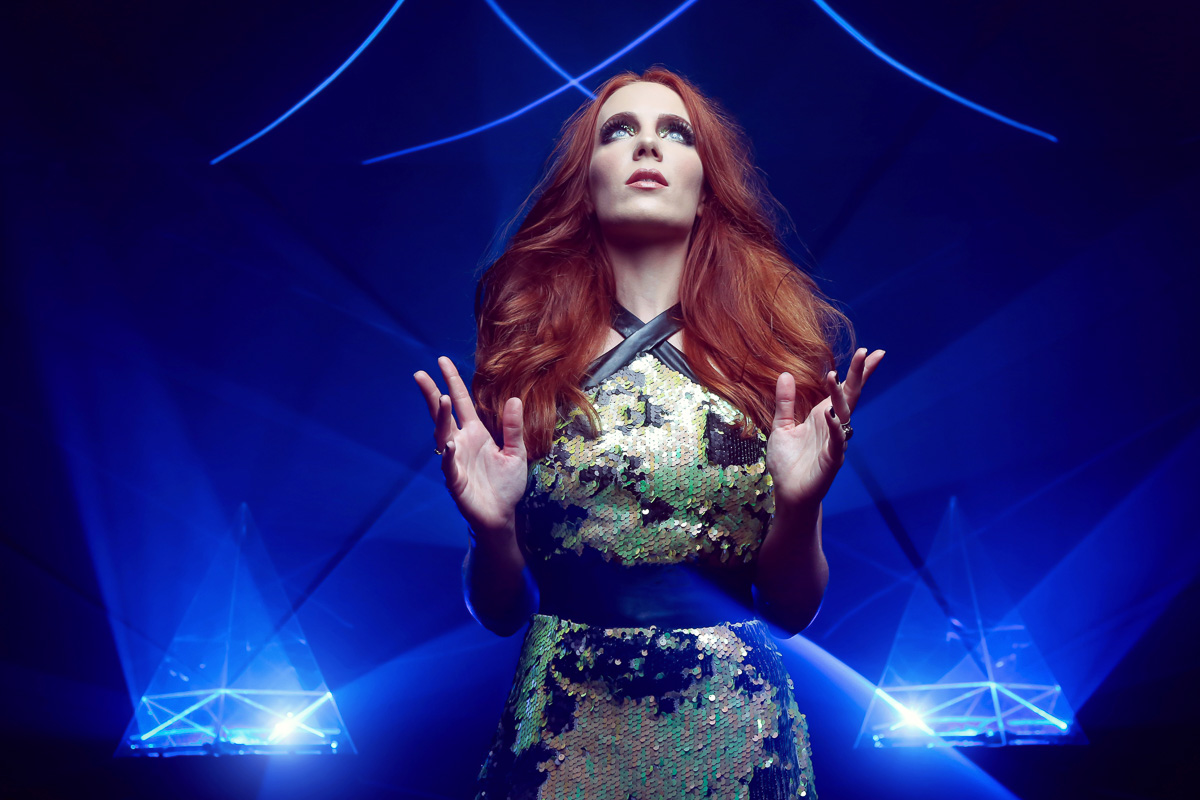Godsmack is a band that I have keenly followed since their inception and the release of their debut album. I have only been afforded the opportunity of seeing them live previously at various festivals. When they announced a UK tour for their latest album, When Legends Rise, I was delighted to see a Manchester show on their itinerary. Finally, I would be able to see them in an indoor setting. Unfortunately, the dates were postponed when a tragic personal event struck the band and I thought that my chance had gone. Godsmack were able to reschedule those dates in February and this time I was able to witness their live brilliance indoors. First, there was a matter of a band interview. Originally arranged with frontman Sully Erna, I was delighted to be informed shortly before my slot that drummer Shannon Larkin would also be present.
ANTIHERO: Good afternoon. Earliest memory of music, the first song that you recall hearing?
Sully Erna: The first song ever?
ANTIHERO: Well, early memories. Maybe a first song that you did in the band, that’s probably easier to recall.
Sully Erna: I don’t know if I remember my first song ever. I would imagine it would have been … I don’t even know. I started so young, I don’t know if I can remember that. I will tell you the most memorable song that I remember hearing for the first time. There’s two of them actually, which was “Last Child” by Arrowsmith and “Victim of Changes” by Judas Priest. Those two songs changed me in ways, so I remember those specifically because they were just the first … Especially, “Victim of Changes” live on my friend’s stereo. It was really, really loud, and it was so powerful, and I remember that was pretty impressive.
ANTIHERO: And it wasn’t just a basic song, it had several time changes and switches around a lot.
Sully Erna: It was just powerful. It was just that big fat riff. I remember his voice and the live audience. It just sounded like I was at a concert because it was so loud in this kid’s house.
ANTIHERO: When Legends Rise, I think, is probably your best work. How do you view it? I mean, do you see it as a complete departure from the band’s earlier albums or just a natural progression from what you had previously created?
Shannon Larkin: Well, yeah, I mean, it was a conscious decision that Sully came to us. He’s got the vision and every record comes four years apart and usually in those four years, he’ll come up with his decision of what he wants our new record to sound like. Obviously, we don’t want to keep making the same record over and over. We’ve tried over the years. The fourth was a woozy record. The fifth one was a happier record, and so on and so forth and this one, he came to us wanting to work with some other writers for the first time and producer guys and we went from there.
There was a maturity, we feel like a rebirth was needed and ready after 20 years. We celebrated 20 years. For any band, that’s a big accomplishment. To me, more than all the accolades and gold records and hits and all, my badge of honor is a 20-year career with this band, so that was a big one for us and so we felt for rebirth and a change was needed and necessary.
So, when he came to us with that idea, first we’re like, oh okay and then, of course, he went off and wrote some songs and the first thing he played was Bulletproof. Then we were like, okay, this sounds very different It still sounds like us but it sounds different enough that I don’t think we’ll alienate our fan base and the production, with the main thing to me that sounded different than our past stuff. We’ve always been very old school in that way and now we’re introduced to all these different sounds and layers and synthesizer underneath the bass and stuff like this that we’d never really experimented with before.
ANTIHERO: I assume then that would it be difficult then to replicate live with all those extra textures and sounds?
Sully Erna: We always pay attention to that in the studio, though. We never overlay it so much that we can’t pull it off live and I think really, sometimes the band even just pulls the stuff off better live than the recordings and that’s a bonus for us because we like to think that we’re one of the last real warriors that go out there and play their instruments and sing in the microphones. With all this technology today, a lot of bands just converted to that like, running Pro Tools all the time and stuff and we just don’t wanna do that.
Shannon Larkin: And you know we tried it and Sully made it maybe two shows and said, “Fucking turn that shit off.” And we became a real band and I was certain, not that the other bands are not real. I’m just saying certain songs we still do it and just the necessary ones that, like I said, like “Bulletproof”, for instance, there’s this cool like low synthesizer thing that’s underneath the bass and the verses that we felt really added to the sound and made us sound a little bit different than we’ve always sounded and so we kept that, but I’m telling you, it went from every song, we tried this thing, got all this…
Sully Erna: Layer it, back it. We were just like, fuck this shit.
Shannon Larkin: It didn’t feel like us.
Sully Erna: We were fat. We were already fat.
ANTIHERO: You mentioned as well, or you said, that you still have a distinct sound that is exclusive and unique to you.
Sully Erna: It is there and plus my voice is really a thread that will always go through any music that we write. It’s like a signature thing and we’ve always said this. You can interchange members all day long and a drum can still sound like a drum and a guitar will still sound like a guitar, but when you change a singer, that really is when your sound changes. So, I think always having that is always gonna help balance that new sound and keep it together so it’s still accepted as Godsmack, but there’s a lot of heavy songs on this record too and then there’s some stuff that again, it’s just some new textures and a new way of presenting a song and it’s been nothing but great responses, so we have nothing to complain about.
ANTIHERO: Do you still listen to other bands? I mean, obviously, you have those early influences that you talked about earlier. For instance, like, Priest and stuff that you mentioned, but do you still listen to what’s happening around you, what’s modern… other bands?
Sully Erna: Not a whole lot going on right now.
Shannon Larkin: Yeah, it’s harder to keep up.
Sully Erna: I hear different band’s names, but I don’t know the stuff as well because I’m just so busy when I’m not with Godsmack that I can’t. I don’t listen to the radio, so I don’t know what’s going on out there and once in a while, I had to learn about new music through my daughter but she’s not really into like metal or rock so much.
ANTIHERO: That’s good as well. I mean, that you can expose yourself to other musical genres and styles.
Sully Erna: Like, I’ve discovered people like James Bay and Post Malone and different artists and I’m cool with that. I think actually it’s kind of cool and it’s actually a breath of fresh air for me to discover a new kind of music because we play such hard music that it’s nice to kind of go somewhere else at times.
Shannon Larkin: The only time I really listen to radio is when we put a new record out because then it’s still the thrill of… When I heard “Bulletproof” for the first time on the radio, there it was. I’m in my car and I’m cranking it up full volume.
ANTIHERO: So, you still get that same rush.
Shannon Larkin: Yeah, that rush has never gone away.
ANTIHERO: What about albums, then? You mentioned the early songs that you remember. Would you have a favorite live album, for example, that you still go back and listen to?
Sully Erna: Just the other day, I put on a couple of them. I have this room in my house now that I made into… I call it the vinyl room and it’s where I put my record player and all my vinyl records and some chill lights and whatever and I go in there and I just listen to vinyl records. I even bought an old Marantz receiver with the dial knobs and all that shit, and I just listen to. I was hooked on the Peter Frampton Live. I was listening to that for a while and I was listening to In A Gadda Da Vida…
ANTIHERO: Iron Butterfly.
Sully Erna: Yeah, some just old songs, old records I remember being a kid and listening to and I love that feelin’ now. I don’t know if it’s because I’m getting’ old or what, but I love that feeling of putting on a record, especially with vinyl of a record that I listened to when I was younger and it just brings me right back to that time and place. It gives me the same sensations and kinda makes me miss my childhood in a way, too. Smoking bongs and listening to…
Shannon Larkin: They’re time machines, those old records, and fun fact, the very first album I ever bought with my own money was Frampton Comes Alive.
ANTIHERO: A link, another link. Well, who would you say has been the most underrated band of all time? Any sort of bands that you’ve maybe discovered or felt that you discovered?
Shannon Larkin: Refused in America. Here, they got their due, but in America, no one knows who they are.
ANTIHERO: What about yourself Sully, anybody stand out for you?
Sully Erna: Well, that’s interesting. I think… I don’t know, it’s hard to say. There’s a lot of bands out there that did really well, had a great career, put out huge hits, probably had great success or whatever but maybe weren’t quite recognized as some other bands were. I know a few that whole Zeppelin era. There was a lot of bands that just got drowned out and they did well for themselves. It’s not like they didn’t, but they were just kind of shadowed because of Zeppelin really.
ANTIHERO: Encompassed everything?
Sully Erna: So, when it got into a… I don’t know, those bands like Triumph and I really thought…
ANTIHERO: Only got into them a few years ago, myself. I was like, bloody good band. How come I haven’t heard of them?
Sully Erna: Yeah, Never Surrender, yeah. I thought they were kind of an underrated band. I thought they were really great stuff, but then there was Rush above them. They were another trio from Canada, and so there’s that. It was like several bands like that, that I remember that were great but there was always that master band that kind of dwarfed all the other ones.
ANTIHERO: There has been a lot of changes in the music business since Godsmack first started out. Do you find that it’s a better time now? Obviously, it’s more different in terms of record sales and you don’t generate the income as you did maybe a few years ago? Bands seem to have to do a lot more to relentlessly kind of make their money back really.
Shannon Larkin: What was the question?
ANTIHERO: Do you find it easier or more difficult these days as a professional musician?
Shannon Larkin: Oh god, that’s a hard question bro, because we’ve been doing this since the ’80s and it was so, so different then. Even like getting signed, when young bands … Oh you know, what do we do? Like, I kind of don’t know what to tell them because back when we were starting, it was … you played, man. You played and played and you’re unsigned. You might even have had to play covers at first and then start working in originals and you started to pack the clubs and then you called the labels when you knew you could pack the club and they’d come out and if they liked you, they’d sign you and they developed the acts and everything has changed now where if you have the internet and Justin Bieber and that kind of thing. It’s all about how many hits you get. If you have 100,000 hits, you get a record deal. Oh, and that’s the way it is nowadays, so I can’t really comment on it.
ANTIHERO: Do you find that there is more of an onus on bands to be more directly involved through social media to actually take a grasp of your own career and put in a lot more physical effort rather than just create the music?
Shannon Larkin: Yeah like I said, it’s hard to give a clear-cut definite answer to that question because there are so many grey areas. You still have bands that just work hard and play and play and play, but then you have that oddball band like Post Malone that makes an internet hit and the next thing you know, he’s the biggest thing in America.
ANTIHERO: What about goals and ambitions? Obviously, everybody keeps driving forwards. Surely all those boxes for you both personally have not been ticked off? Do you still have hopes, dreams, ambitions?
Sully Erna: I have different things. I realized several years ago… I actually heard an interview with Tom Hamilton and it reminded me of kind of where I sit in my life right now where he said, music is something I always wanted to do in my life, but it’s not everything I wanted to do in my life, and I think that’s how I feel. I will always play music. I will always be a part of this. I will probably always do some kind of solo work because there are other kinds of music that I also enjoy that it would take Godsmack too far in the other direction if I tried to implement it. I take bits and pieces and textures of it is what helps this thing evolve, but I think my point is, I’ll always play music, but I also enjoy doing other things too.
Sometimes it’s nice when you get to break away from the band too and for me, I’ve always enjoyed acting. I’ve been lucky enough to do some movies and some TV stuff and I really enjoy that and I would do more of that if I was given the opportunities and the right parts and there’s just like other things that I enjoy doing when I’m not playing with the band, but I think if I was just limited to just doing those things and I never had the band again, I think I would feel kind of empty too. I think there would be a void if music wasn’t around anymore.
I know there’ll be a point where like, we may decide that like all right, we’re at a certain age now. Maybe the touring is getting tiring and we may need that to relax or stop or whatever, but I think music will always be in my life somehow, even when I’m old and grey, I think.
ANTIHERO: Shannon, outside of music, what do you enjoy doing?
Shannon Larkin: Tony and I have a blues band that we like to do, and we enjoy our Harley-Davidson motorcycles. We live in Florida so that we can ride all year long and I’ve been just into planting plants and trees and… We’ll do a landscape right now. I made a Japanese garden and a koi pond. And I practice the occult sciences, and study and practice magic and…
Sully Erna: You’re a property manager.
Shannon Larkin: That takes a lot of my time but it’s also a serene thing that centers me and grounds me in my soul. I feel like I’m one with the universe.
ANTIHERO: I have seen the setlist and it seems to take in every album and aspect of the band’s career to date.
Sully Erna: I usually try to control that part because of my vocals and the breaks that I need in between, what I can push myself on, what I need to lay back on and also, I sequence it like I would an album. I like it to come out strong and do its kind of thing and then, it will eventually hit a lull into some pockets and then ramp itself back up and then the finale. So, for me, a lot of the pace is important, but I think these guys agree. I think they would be able to do the same thing if they were to organize it and I think they would think the same way. Like shows got to have peaks and valleys.
ANTIHERO: I love the elements of fun with cover bits and things as well.
Sully Erna: Yeah, it’s still fun, yeah.
ANTIHERO: Okay, that’s great. Thank you very much.

